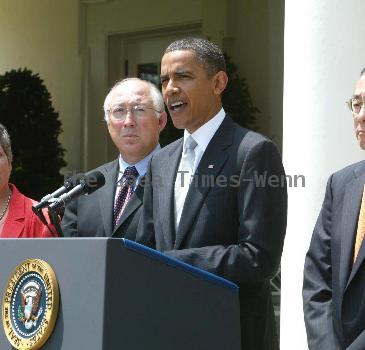Decision to halt Arctic Ocean drilling panned by Alaska leaders, praised by enviro groups
By Dan Joling, APFriday, May 28, 2010
Arctic Ocean drilling decision panned, praised
ANCHORAGE, Alaska — Alaska’s congressional delegation on Thursday blasted President Barack Obama’s decision to delay offshore oil drilling in the Arctic Ocean, saying the move will cause more delays and could have big economic consequences.
Environmental and Alaska Native groups, meanwhile, reacted with gratitude.
Obama announced Thursday that proposed lease sales off the coasts of Alaska and Virginia and the Gulf Coast will be delayed or canceled. Arctic drilling would not be considered until 2011.
Shell Oil has been poised to drill three exploratory wells this summer in the Chukchi Sea off Alaska’s northwest coast and two in the Beaufort Sea off the state’s north coast.
Republican Rep. Don Young called the Obama administration’s decision irrational and careless, a response to interest groups following the massive oil spill from a BP PLC well in the Gulf of Mexico. That spill has surpassed the 1989 Exxon Valdez disaster as the nation’s worst.
“The kind of event that happened in the gulf, while tragic, is so uncommon,” Young said in a written statement. “It is akin to an American jetliner crashing. If a plane goes down, we don’t stop flying.”
He said the right response would have been to figure out what went wrong and correct the problem.
Environmental and Alaska Native groups have said it would be impossible to clean up a spill in Arctic waters far from deep water ports and airports.
“Until a full review of what happened to cause the devastation in the Gulf of Mexico and of Shell’s plans to deal with a similar situation, it would be irresponsible to continue drilling as if nothing happened,” said William H. Meadows, president of The Wilderness Society.
Edward Itta, mayor of the North Slope Borough, which covers much of Alaska’s Arctic coast, said the gulf spill “has confirmed the many questions we have about safe practices and federal oversight. Everyone benefits from a delay at this point.”
Brendan Cummings of the Center for Biological Diversity, one of the groups that successfully petitioned to list polar bears as a threatened species, went even further: “What we really need is revocation of the improperly issued leases and permanent protection of the Arctic,” he said. “The fact that no technology exists to effectively clean up an oil spill in Arctic waters will not be changed in a year’s time.”
Upward of 90 percent of Alaska general fund income comes from the petroleum industry, and keeping oil in the trans-Alaska pipeline, which now operates at about a third of its capacity, is a perennial concern for state officials. Gov. Sean Parnell and other Alaska leaders have looked to Alaska’s northern outer continental shelf, which holds an estimated 25 billion barrels of oil and 120 trillion cubic feet of natural gas.
Parnell said the decision to suspend drilling operations in the Arctic Ocean was based on fear, not sound science. Vigorous opposition has led to administrative and court challenges on almost every front, he said.
“Those challenges were summarily rejected, including a decision from the 9th Circuit only two weeks ago rejecting the meritless claims of multiple environmental groups and coastal villages,” Parnell said.
Alaska’s two senators, like Young, said economic consequences have to be considered.
“If the delay is for a season to ensure we have the highest levels of protection in place, that’s one thing,” said Republican Lisa Murkowski. “But if it means that existing permits are allowed to lapse — effectively killing Shell’s participation in Alaska — that’s not acceptable to me or Alaska.”
Shell Oil, the U.S. arm of Royal Dutch Shell PLC, paid the federal government $2.1 billion for just the Chukchi Sea leases in 2008. Murkowski said she spoke Wednesday night to Shell Oil President Marvin Odum and was told the company needs a firm commitment that the delay will not go beyond next spring.
“We need to be able to tell Shell that this one-year delay isn’t in reality a life sentence,” Murkowski said. “Otherwise this decision puts Shell’s entire Alaska program at risk.”
Democratic Sen. Mark Begich said the decision to suspend leases will cause more delays and lead to higher costs for domestic oil and gas production. Shell had updated its exploratory drilling plans and made significant investments to address the concerns raised by the gulf spill, he said.
“Another year of delay costs money and Alaska jobs,” Begich said.
Shell Alaska Vice President Pete Slaiby said the company respects and understands the decision in the context of the gulf spill.
“But we remain confident in our drilling expertise, which is built upon a foundation of redundant safety systems and company global standards,” he said in an e-mail. “In Alaska, our drilling plans have undergone an unprecedented level of review, including scrutiny from the courts, regulators and stakeholders. We welcome this scrutiny and will work closely with the government and other experts during this suspension in drilling activities.”
Tags: Accidents, Alaska, Anchorage, Animals, Barack Obama, Coastlines And Beaches, Corporate Crime, Energy, Environmental Concerns, Mammals, Municipal Governments, North America, Oceans, United States

